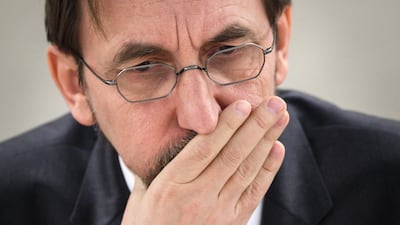Since late March, Israeli security forces have killed 106 Palestinians, including 15 children, in a chilling escalation of violence. Amid so much bloodshed, the passage of a UN Human Rights Council motion paving the way for an independent inquiry into the killing of 60 protesters in Gaza last Monday is a small but crucial token of humanity.
So too were the remarks of UN High Commissioner for Human Rights, Zeid Ra’ad Al Hussein, who said: “Gazans are, in essence, caged in a toxic slum from birth to death, deprived of dignity, dehumanised by the Israeli authorities.”
Tragically, it is unlikely to have any impact on Israel’s track record of acting in contravention of international law, which the UAE's Ambassador to the UN, Lana Nusseibeh, forcibly condemned today.
After Tel Aviv accused the council of anti-Israel bias, its ambassador to the UN, Danny Danon, described the motion as an effort “to support Hamas’s war crimes”. The motion might be symbolically important but it is unlikely to punish Israel or alleviate the suffering of a people bedevilled by occupation for seven decades.
The search continues for a path to peace. Next month, US President Donald Trump's highly anticipated Middle East peace plan will be unveiled. Aside from the questionable calibre its drafters – Mr Trump's son-in-law Jared Kushner and special envoy for international negotiations Jason Greenblatt – the plan is shrouded in secrecy.
In a conflict as intractable as this, any concerted attempt to find a resolution is welcome. It is time for the deal-maker president to deliver.
Nevertheless, ahead of the prospective roll-out, the US has sparked anger in response to Mr Trump's ruinous embassy move and refusal to censure Israel's brutality. On Tuesday, the US blocked a Kuwaiti draft resolution expressing "outrage and sorrow at the killing of Palestinian civilians" and calling for an investigation. Its peace plan will require the endorsement of the Palestinians and Arab states after its role as an objective arbitrator has been brought into question.
Meanwhile, the US has reportedly slashed aid for projects in Gaza and the West Bank. Against that backdrop, a former US special envoy for Israeli-Palestinian negotiations described Mr Trump’s chances as “somewhere between zero and none”.
As UAE Minister of State for Foreign Affairs, Dr Anwar Gargash, said on Friday: "Achieving stability in our region is not a task we can leave to America or Europe."
That day, a summit of Muslim leaders in Istanbul called for the creation of an international peacekeeping force to protect Palestinians. The UN Human Rights Council resolution is steeped in symbolism but the body lacks the authority to enforce its decisions.
Increasingly it seems Arab states need to lead the way in carving a more hopeful future for a region they understand better than anyone else. In 2002, the Arab league signed the Arab Peace Initiative. It still offers a roadmap for peace.

